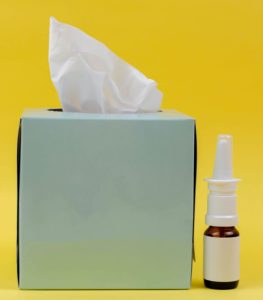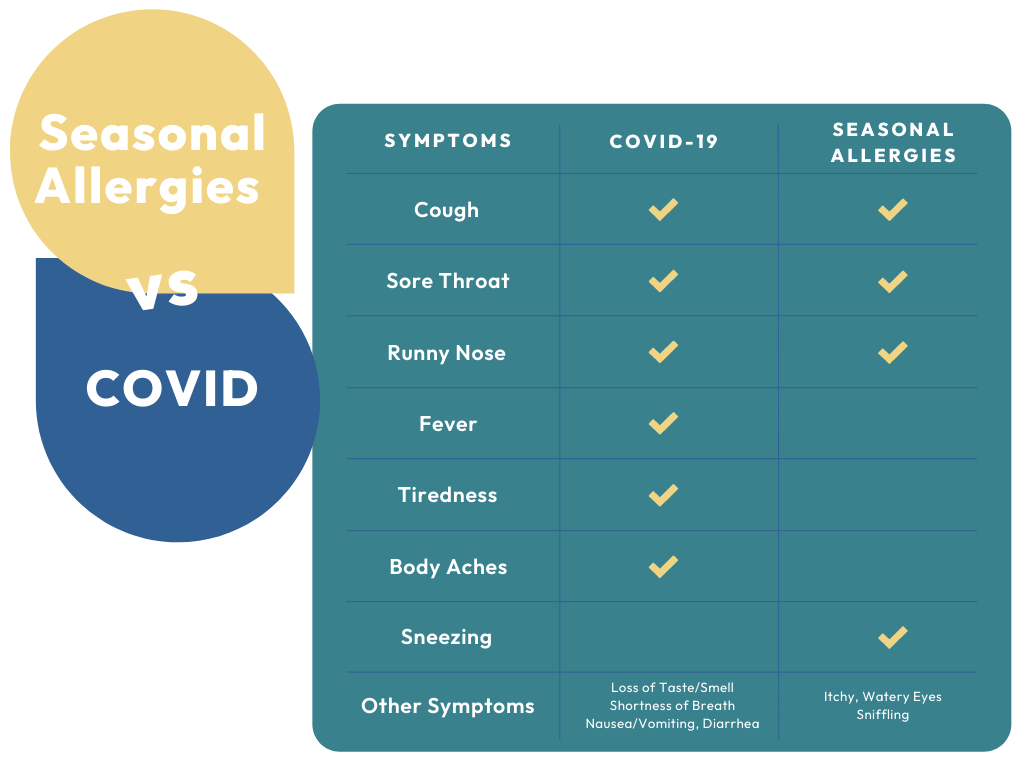
Spring has sprung in Colorado and you know what that means, spring allergies. Seasonal allergy symptoms can begin as early as February in Colorado and can often be mistaken for COVID symptoms.
It seems we are still not out of the woods when it comes to the COVID pandemic. The virus is still lingering amongst our communities, so it is important to know how to distinguish between the run-of-the-mill allergy symptoms and COVID-19.
Seasonal Allergies
Allergies or hay fever, also called allergic rhinitis, can be caused by many things and every person seems to be affected differently. There are outdoor allergens and indoor allergens that can cause allergic reactions. While some may experience extreme symptoms, others may only have a slight sniffle. The good news is most seasonal allergies are not life threatening.
Seasonal allergies are caused by local plant pollens, tree pollens, and even grass pollens. Flora bloom and pollinate at different times of the year, which may cause allergic reactions beginning in spring and continuing throughout the year.
According to the Colorado Allergy & Asthma Centers, Spring is the time when, “most trees start to release pollen.” You may experience symptoms such as:
- Scratchy, watery, or itchy eyes
- Nasal congestion, runny nose, or inflammation of the nasal passages
- Sore or itchy throat
- Ear congestion
- Headache
- Fatigue
While seasonal allergies are not usually serious, they can be bothersome and mimic symptoms of other conditions like COVID or the common cold. The Mayo Clinic also mentions that allergies may cause or worsen other ailments that are more serious such as asthma, anaphylaxis or serious allergic reactions, and ear infections.

COVID Similarities
By now most of us are very aware of COVID-19 and the symptoms associated with the virus. While COVID affects everyone differently, it seems there are some symptoms that are this illness’ trademark. According to the CDC, these symptoms include:
- Fever
- Cough
- Chills
- Difficulty or labored breathing
- Exhaustion or fatigue
- Muscle/body aches
- Loss of the ability to taste or smell
- Scratchy or sore throat
- Nasal congestion or runny nose
- Nausea/vomiting
- Diarrhea
Unfortunately, many of these COVID symptoms are shared with a variety of different health conditions, including seasonal allergies. Symptoms such as sore throat, cough, and runny nose are symptoms COVID and seasonal allergies share. Allergies affect so many people this time of year, so families may feel uneasy that they or their loved ones might have COVID.
Differences: What Can You Do?
Since everyone experiences seasonal allergies and COVID differently, there really is only one sure way to find out which illness is the culprit; getting tested. Getting a COVID test is easy when you or your loved one exhibits these symptoms.
Rapid Testing LLC in Colorado is partnering with Advanced Urgent Care & Occupational Medicine to offer curbside rapid COVID testing 7 days a week. Click here to learn the COVID test differences and to schedule testing.
As the Asthma and Allergy Foundation of America mentions, healthcare professionals are only able to diagnose allergies by doing tests, “reviewing your personal and medical history [or by giving] you a physical exam.” Treating seasonal allergies could mean getting prescribed a simple medication to needing blood tests or even receiving allergy shots.
Depending on the severity of your symptoms, you may consider being seen by a provider or simply getting tested. Ruling out the possibility of COVID can help you to take the next steps to being symptom free.
Seasonal Allergies Treatment
If you are having allergy symptoms that persist after the use of over-the-counter medicine, you may want to see a healthcare provider. After being seen by a clinic or doctor, they may refer you to professional allergists that specialize in the treatment of persistent or serious allergies.
ACAAI explains that there are ways to attempt to avoid seasonal allergies altogether. They emphasize that it is important to “stay ahead of symptoms” by:
- Taking allergy medication 2-3 weeks before symptoms might occur.
- Identifying allergy “triggers.”
- Keeping windows and doors closed during the spring and summer months.
- Touching base with a healthcare provider to see which options are available to avoid serious allergic reactions if you’ve had them in the past.
You can also stay ahead of the allergies by going to Pollen.com to get real-time updates regarding “allergy levels and pollen count forecasts” in Colorado.
We Can Help
Rapid Testing LLC is partnering with Advanced Urgent Care & Occupational Medicine in Colorado to offer a variety of rapid COVID testing options. These tests include the antigen rapid test as well as molecular tests like the RT-PCR tests. Whatever your testing needs may be, Rapid Testing LLC has you covered.
If you are currently suffering from allergies and are unsure what to do next, consider COVID testing to rule out the virus. Rapid Testing LLC makes testing easy. Rapid Testing LLC offers curbside COVID testing so you can schedule an appointment online, get tested in the comfort of your own vehicle, and receive your results the same day! Click here for more information or to schedule a test.
Do you need to be seen by a healthcare provider for your allergies or COVID symptoms? Advanced Urgent Care & Occupational Medicine accepts walk-ins and makes it easy to reserve your spot for a visit online. They have clinics across the Denver metro area. All of their clinics are open 7 days a week for your convenience! Visit Advanced Urgent Care & Occupational Medicine today!